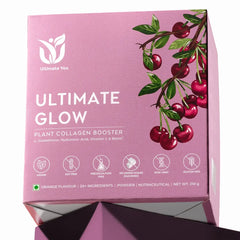Tired of brittle hair? Biotin helps boost your hair’s strength, reduce breakage, and encourage healthy growth for fuller, more vibrant hair.
Are you tired of dealing with brittle, thinning, or slow-growing hair? You're not alone.
Many of us struggle with hair growth issues, and expensive hair care treatments often promise the world but fail to deliver. However, there's a simple and effective solution: Biotin.
What is Biotin?
Biotin is a B-complex vitamin (B7) that plays a crucial role in boosting hair growth, strengthening hair follicles, and improving the health of your locks. It converts food into energy, maintaining healthy hair, skin, and nails and supporting nerve function. It's a water-soluble vitamin found in foods like eggs, nuts, and leafy greens.
Unlike pricey salon treatments or harsh chemicals, biotin is a natural and affordable solution that's suitable for everyone.
In fact, studies have shown that up to 90% of people who take biotin supplements experience significant hair growth and improvement.
Let's delve into the topic!
Is Biotin Good for Hair?
Biotin supplementation promotes hair growth, strengthens hair shafts, regulates hair follicle health, and protects hair from damage with its antioxidant powers, according to the Journal of Investigative Dermatology. With these science-backed benefits, biotin is a trusted choice for achieving healthy, luscious locks.
Can Biotin deficiency cause hair loss?
Yes, biotin deficiency can cause hair loss. When biotin levels are low, hair loss can occur due to:
Weakened hair follicles: Biotin deficiency can cause hair follicles to become weak, leading to hair breakage and loss.
Slowed hair growth: Biotin is essential for hair growth, and a deficiency can slow down the growth cycle, leading to thinner, shorter hair.
Hair thinning: Insufficient biotin levels can result in hair becoming fragile, causing hair to become thinner and shed excessively.
Causes of Biotin Deficiency
Biotin deficiency is due to poor diet, certain medications, and underlying medical conditions like celiac disease or Crohn's disease, which disrupt the body's ability to absorb biotin. Pregnancy, smoking, and excessive alcohol consumption can also lead to biotin deficiency. Here are few of them:
Inadequate Dietary Intake: Despite being present in foods like eggs, nuts, and whole grains, a poor diet can cause biotin deficiency.
Genetic Disorders: Certain inherited conditions, such as biotinidase deficiency, impair the body's ability to utilise biotin effectively. This can result in a deficiency even if dietary intake is sufficient.
Long-term Antibiotic Use: Prolonged use of antibiotics can disrupt the balance of gut bacteria that produce biotin, leading to a deficiency.
Pregnancy: Pregnant women may require higher amounts of biotin, and insufficient intake can sometimes lead to hair loss.
Alcohol: Chronic intake of alcohol can disrupt the absorption and use of biotin, leading to an elevated risk of deficiency.
Symptoms of Biotin Deficiency
Biotin deficiency symptoms include brittle hair, hair loss, thinning nails, skin rashes, fatigue, and neurological issues. Read on to know more!
Skin Issues: Dry, scaly skin or rashes, particularly around the eyes, nose, and mouth, are common symptoms. These skin problems can be a direct result of insufficient biotin.
Nail Problems: Brittle nails that break easily can indicate a lack of biotin. The vitamin is essential for maintaining strong and healthy nails.
Fatigue and Weakness: Biotin plays a role in energy production as its deficiency can lead to general fatigue and muscle weakness.
Neurological Symptoms: In severe cases, biotin deficiency may cause neurological symptoms like depression, confusion, or hallucinations.
Hair Loss: Thinning hair or hair loss can be a visible sign of biotin deficiency. If you're experiencing increased hair shedding or thinning, it could signal that your body needs more biotin to support your hair's health and vitality.
10 Amazing Benefits of Biotin for Hair Growth
If you've been struggling with hair issues, biotin might be just what you need. Here are ten amazing benefits of biotin for hair growth:
Strengthens Hair Strands
Biotin is well-known for its capacity to fortify hair strands all the way from the roots to the ends. It boosts the generation of keratin, a crucial protein that forms the key structural foundation of hair. By increasing keratin levels, biotin helps prevent hair breakage and reduces split ends.
Promotes Hair Growth
One of biotin's standout benefits is its ability to stimulate hair growth. Biotin supplementation supports the metabolic processes involved in hair follicle health, encouraging the production of new hair cells.
Hair Thickness
Biotin can help in increasing the thickness of your hair. Regular intake of biotin supplements often results in thicker hair strands, which can make your hair appear fuller and more voluminous.
Hair Elasticity
Healthy hair should be flexible and elastic. Biotin contributes to the elasticity of your hair, reducing the likelihood of breakage and damage. This improved elasticity helps in maintaining the overall health of your hair, allowing it to withstand daily wear and tear.
Reduces Hair Loss
Biotin has been found to play a crucial role in reducing hair loss. By aiding the health of hair follicles and facilitating the proper delivery of nutrients, biotin assists in reducing hair loss. It is especially useful for those who suffer from alopecia or other forms of hair loss.
Scalp Health
Biotin improves scalp health by ensuring that the scalp receives adequate nutrients and maintains a balanced environment. This can help prevent scalp issues like dryness, flakiness, and irritation, which can hinder hair growth.
Balances Oil Production
Biotin helps regulate the oil production on the scalp. An imbalance in scalp oil levels can lead to dandruff or greasy hair, which can affect hair growth. By maintaining balanced oil production, biotin supports a healthier scalp and, consequently, better hair growth.
Enhances Overall Hair Appearance
Not only does biotin enhance and stimulate growth, but it also enhances the general look of your hair." With regular biotin intake, you'll likely notice shinier, healthier-looking hair. This vitamin helps to enhance the natural lustre and smoothness of your hair, making it look vibrant and well-maintained.
Supports Hair Follicle Health
Healthy follicles are crucial for producing new hair and supporting existing strands. Biotin aids in the regeneration of hair follicles, ensuring they remain in optimal condition to support robust hair growth.
Combats Hair Damage
Environmental factors, such as UV rays and pollution, can damage your hair over time. Biotin helps combat this damage by supporting the repair and regeneration of hair cells. Its antioxidant properties protect hair from free radicals, thereby reducing damage and promoting healthier hair growth.
A study from the National Center for Biotechnology Information (NCBI) says that Biotin has gained commercial popularity for its claimed benefits on healthy hair and nail growth.
Incorporating biotin into your routine—through diet or supplements—can provide these impressive benefits and support the health and growth of your hair. Before beginning a new supplement routine, it's crucial to seek advice from a healthcare professional to confirm its appropriateness for your specific requirements. Biotin offers a wide range of benefits and can help maintain healthy, beautiful hair.
Your Daily Biotin Needs: How much biotin should you take?
Biotin supplements can be easily found in stores, but it's important to be mindful of the appropriate dosage. Unlike some other nutrients, there isn't a set Recommended Dietary Allowance (RDA) for biotin. However, a daily Adequate Intake (AI) has been established to help ensure that you are getting a sufficient amount of biotin.
The recommended daily adequate intake for biotin varies significantly by age and life stage. This variability is important to be aware of, as it ensures that you're getting the right amount of biotin for your specific needs. Here is the breakdown:
- Infants (0-6 months): 5 mcg
- Infants (7-12 months): 6 mcg
- Toddlers (1-3 years): 8 mcg
- Children (4-8 years): 12 mcg
- Children (9-13 years): 20 mcg
- Teenagers (14-18 years): 25 mcg
- Adults (19+ years): 30 mcg
- Pregnancy and breast-feeding: 35 mcg
Overall, biotin is generally safe even at high doses. However, it's important to remember that dietary supplements aren't regulated like drugs. Additionally, choose biotin products that have been third-party evaluated for quality and potency.
It's always best to consult with a hair care professional to know the appropriate dosage for your overall well-being. This will give you the confidence that you're taking the right steps for your health.
Types of Biotin for Hair Growth
Biotin is often hailed for its potential benefits for hair growth. Here's a look at the different types of biotin products you might come across:
Biotin Supplements
These are the most common ways people incorporate biotin into their diet. Available in various forms like tablets, gummies, and powders, biotin supplements are designed to support overall health and potentially boost hair growth. They're easy to take, offering a convenient way to ensure you're getting a consistent dose without any hassle.
Of all, biotin supplements are a popular choice for those seeking to boost hair growth, strengthen nails, and enhance skin health. Among the numerous options available, Ultimate Collagen stands out as a premium choice. This marine collagen blend, infused with hyaluronic acid, vitamin C, and biotin, offers a comprehensive approach to beauty from within.
What sets Ultimate Collagen apart? Unlike other brands that use low-quality collagen, Ultimate Collagen is sourced from wild-caught fish, ensuring maximum bioavailability. The delicious berry-flavoured serving makes it easy to incorporate into your daily routine.
But don't just take our word for it! In a remarkable 60-day trial, 83% of users noticed glowing skin, thicker hair, and stronger nails. Without further ado, experience the transformative power of Ultimate Collagen and reveal your ultimate glow.
Biotin-Rich Foods
If you prefer a more natural approach, eating biotin-rich foods can be effective. Foods like eggs, nuts, seeds, and sweet potatoes are packed with biotin. Including these in your diet can help provide your body with the nutrients it needs to promote healthy hair growth from within.
Biotin Shampoos
These shampoos are formulated with biotin and are designed to be massaged into the scalp during your regular hair-washing routine. While they don't directly influence hair growth, they can strengthen hair and improve scalp health.
Biotin Capsules
Similar to biotin supplements, biotin capsules provide a concentrated dose of the vitamin. They're convenient and can be a great option for those who prefer a simple yet no-fuss approach to getting their biotin. However, like other supplements, it's important to follow recommended dosages to avoid excessive intake, which can lead to acne or digestive issues.
Biotin Serums
Biotin is a coenzyme that supports metabolic reactions for healthy skin and hair, says the National Library of Medicine (NLM). There are topical products designed to be applied directly to the scalp. Biotin serums are often combined with other ingredients, such as vitamins and minerals, that support hair health. By nourishing the scalp and hair follicles, they may help promote stronger and healthier hair growth over time.
Exploring these various biotin choices enables you to discover the approach that aligns best with your lifestyle and requirements. Whether through diet, topical applications, or supplements, incorporating biotin could be a beneficial step towards achieving your hair health goals.
Side Effects of Consuming Biotin
Remember this information: Biotin is usually safe, but taking high doses or using it with specific medications can result in side effects such as stomach irritation, skin eruptions, and allergic responses. Let's discuss them in detail!
Digestive Issues: Some people might experience nausea, cramping, or diarrhoea when taking high doses of biotin. If your stomach feels upset, it might be time to adjust your dose.
Skin Reactions: Consuming biotin may lead to skin problems such as rashes or acne. If you observe any unusual changes in your skin after beginning biotin supplementation, it's advisable to consult your skincare specialist.
Lab Test Interference: High levels of biotin can mess with certain lab tests, especially those related to thyroid function or heart health. This could lead to inaccurate results, so let your healthcare provider know if you're taking biotin before any blood tests.
Possible Allergic Reactions: There is a possibility that specific individuals may experience an allergic response to biotin supplements. Be vigilant for indications such as itching, swelling, or difficulty breathing, and promptly seek medical assistance if any of these symptoms manifest.
Overuse Concerns: Since biotin is a water-soluble vitamin, your body generally gets rid of excess through urine. However, taking extremely high doses can still lead to unwanted side effects, so stick to recommended amounts.
When to Consult a Doctor?
If you're considering biotin for hair growth, it's essential to consult a trichologist to discuss the best approach for your individual needs. A doctor can identify underlying health issues that may be contributing to hair loss or slow growth, such as thyroid problems, nutritional deficiencies, or autoimmune disorders. They can provide personalised advice on the appropriate biotin dosage, duration of treatment, and potential interactions with other medications.
Final Thoughts
Biotin is a simple and effective way to achieve healthy, beautiful hair. By choosing the right type of biotin for your needs, and combining it with a balanced lifestyle, you can say goodbye to brittle locks and hello to radiant, luscious hair. With biotin, you're not just taking a step, you're leaping towards achieving your hair goals.
We're here to help! If you have any questions about biotin and hair care, we'd love to hear from you. Feel free to drop them in the comments.
Disclaimer
The information provided is for educational purposes only and is not intended to be a substitute for medical treatment. If you're pregnant, nursing, taking medication, or have a medical condition, it's better to consult a healthcare professional. Ultimate You does not provide any guarantee regarding the accuracy, adequacy, completeness, legality, reliability, or usefulness of the information and disclaims any liability arising from it.

Ram Charan
Content Lead
With over 7 years of experience, he crafts engaging stories and compelling narratives. He believes crisp and engaging content adds value to customers and drives immense sales to businesses. When he's not working, you'll find him hanging out with friends, binge-watching movies, and exploring the world of organic foods.
Tags
Frequently Asked Questions
Can I take biotin during pregnancy or breastfeeding?
Before taking biotin while pregnant or breastfeeding, make sure to consult a doctor, as biotin requirements may differ during these periods.
Does biotin work for all hair types?
Biotin works for most hair types (wavy, curly, straight), but results may vary.
Can biotin reverse hair loss?
Biotin can potentially slow or stop hair loss, but individual results may vary. It is advised to consult a doctor before opting for biotin treatment.
Can biotin be used with other hair treatments?
Yes, biotin can be used with other hair growth treatments like minoxidil or low-level laser therapy.
How much biotin do you take daily for hair growth?
Take 2,500-3,000 mcg (micrograms) of biotin daily for hair growth. This dose promotes hair growth, strengthens hair follicles, and improves hair texture.
Which is better for hair growth: biotin or folic acid?
Biotin directly promotes hair growth, while folic acid supports overall health. Consider taking both for optimal hair growth benefits.
How long does it take for biotin to work for hair growth?
Biotin's effects on hair growth may take 3-6 months to become noticeable, as it works steadily to fortify hair follicles and stimulate growth.
How do you use biotin oil for hair growth?
Massage biotin oil into your scalp, leave it on overnight, and wash it out in the morning. Repeat 1-2 times a week for best hair growth results.
What is better for hair growth: biotin or collagen?
Biotin is more effective for promoting hair growth compared to collagen. Biotin specifically encourages hair growth, while collagen is beneficial for maintaining the health of the skin and nails.
- Choosing a selection results in a full page refresh.
- Opens in a new window.
15%

on your next order
By submitting your email address, you agree to receive marketing emails from Ultimate You at the email address provided. We may use information collected about you on our site to suggest the products and offers. you can withdraw your consent at any time by following the unsubscribe instructions in any email we send to you. view Terms and Privacy. Contact Ultimate Customer Care at #204-8430 Saint Monica Building, near Char Miner, Hyderabad, India, 203455.






